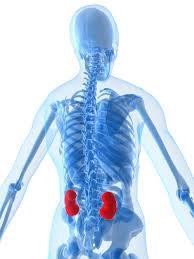What is the primary function of the kidneys?
 The kidneys are two bean-shaped organs located above the waist near the spine beneath the lower ribs. Each kidney is a little bit bigger than your fist. What the kidneys provide are important in many bodily functions such as:
The kidneys are two bean-shaped organs located above the waist near the spine beneath the lower ribs. Each kidney is a little bit bigger than your fist. What the kidneys provide are important in many bodily functions such as:
- Control the amount of water and other substances in your body such as potassium, sodium, calcium, and phosphorous
- Rid the body of waste products such as urea and creatinine
- Help regulate blood pressure control
- Stimulate red blood cell production
- Help maintain your body’s acid-base balance
- Excrete many drugs
- Clean and control the amount of blood in the body
- Make hormones that help bone marrow produce red blood cells
Additional Resources:
Evaluation and Pre-Transplant ›


